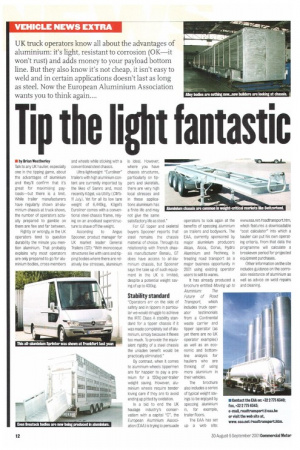Tip the light fantastic
Page 12

If you've noticed an error in this article please click here to report it so we can fix it.
• by Brian Weatheriey Talk to any UK haulier, especially one in the tipping game, about the advantages of aluminium and they'll confirm that it's great for maximising payloads—but there is a limit. While trailer manufacturers have regularly shown all-aluminium chassis at truck shows, the number of operators actually prepared to gamble on them are few and far between.
Rightly or wrongly, in the UK operators tend to question durability the minute you mention aluminium. That probably explains why most operators are only prepared to go for aluminium bodies, cross-members and wheels while sticking with a conventional steel chassis.
Ultra-lightweight "Euroliner" trailers with Ngh aluminium content are currently imported by the likes of Samro and, most recently KOgel, via Utility (CM511 July). Yet for all its low tare weight of 6,440kg, KOgel's Euroliner comes with a conventional steel chassis frame, relying on an anodised superstructure to shave off the weight.
According to Angus Spooner, product manager for UK market leader General Trailers (GT): With monocoque structures like with vans and tipping bodies where there are relatively low stresses, aluminium
is ideal. However, MMNIIML-1 where you have chassis structures, particularly on tippers and skeletals, there are very high local stresses and in these applications aluminium has a finite life and may not give the same satisfactory life as steel."
For GT tipper and skeletal buyers Spooner reports that steel remains the chassis material of choice. Through its relationship with French chassis manufacturer Benalu, GT does have access to all-aluminium chassis, but Spooner says the take up of such equipment in the UK is limited, despite a potential weight saving of up to 400kg.
Stability standard
'Operators err on the side of safety and in tippers in particular we would struggle to achieve the IRTE Class A stability standard for a tipper chassis if it was made completely out of aluminium, simply because it flexes too much. To provide the equivalent rigidity of a steel chassis the unladen benefit would be practically eliminated."
By contrast, when it comes to aluminium wheels tippermen are far happier to pay a premium for a 120kg-per-trailer weight saving. However, aluminium wheels require tender loving care if they are to avoid ending up pitted by oxidation.
In a bid to end the UK haulage industry's conservatism with a capital "C", the European Aluminium Association (EAA) is trying to persuade operators to look again at the benefits of speccing aluminium on trailers and bodywork. The EAA, currently sponsored by major aluminium producers Alcan, Alcoa, Corus, Hydro Aluminium and Pechiney, is treating road transport as a major business opportunity in 2001 using existing operator users to sell its wares.
It has already produced a brochure entitled Moving up to Aluminium: The Future of Road Transport, which includes truck oper ator testimonials from a Continental waste carrier and tipper operator (as yet there are no UK operator examples) as well as an economic and bottomline analysis for hauliers who are thinking of using more aluminium in their vehicles.
The brochure also includes a series of typical weight savings to be enjoyed by speccing aluminium in, for example, trailer floors.
The EAA has set up a web site: www.eaa.netfroadtransport.htm, which features a downloadable "cost calculator" into which a haulier can put his own operating criteria. From that data the programme will calculate a breakeven period for projected equipment purchases.
Other information on the site includes guidance on the corrosion resistance of aluminium as well as advice on weld repairs and cleaning.




















































































































